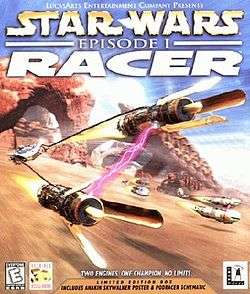Star Wars Episode I: Racer
| Star Wars Episode I: Racer | |
|---|---|
 | |
| Developer(s) | LucasArts |
| Publisher(s) |
LucasArts Nintendo |
| Platform(s) | Microsoft Windows, Nintendo 64, Game Boy Color, Mac OS, Dreamcast, Arcade |
| Release date(s) |
Windows Nintendo 64
Game Boy Color Macintosh
Dreamcast Arcade
|
| Genre(s) | Racing |
| Mode(s) | Single-player, multiplayer |
Star Wars Episode I: Racer is a racing video game based on the pod race featured in Star Wars Episode I: The Phantom Menace. As of 2011, the game holds the Guinness record as the best-selling sci-fi racing game, having worldwide sales of 3.12 million and beating other series like Wipeout and F-Zero.[1] An arcade version of the game featuring many similar tracks and characters was released in 2000.[2]
Gameplay
Star Wars Episode I: Racer features a variety of tracks spanning several different planets. It includes all of the racers featured in the movie and more, including Teemto Pagalies, Dud Bolt, Mars Guo, and Ben Quadinaros.
Game modes

The following is a list of different playing modes featured in the game:
- Tournament: The primary game mode. Race for money to buy parts or pit droids, and unlock new tracks, racers, and upgrades. There is no difficulty setting in this mode.
- Free Race: Allows you to practice any previously unlocked courses using any unlocked racer. However, you cannot earn money or unlock tracks and racers. You can, however, set the difficulty of your opponents.
- Time Attack: The same as Free Race except you race against the clock constantly trying to improve your time. This mode is absent from the PC version in which, instead, the free play mode allows the player to set the number of computer opponents to 0.
- 2 Player: Race against another real player on any unlocked course. You can adjust the difficulty, number, and speed of the computer opponents.
- Multiplayer: Race against other players on a local network on any unlocked course. The PC version uses the deprecated[3] IPX protocol to accomplish this, while the Macintosh version uses the TCP/IP stack. The multiplayer mode can support up to 8 players.[4]
Release
Star Wars Episode I: Racer was developed and published by LucasArts for Windows PCs in April 1999. Later, the game was ported and released for several other platforms: Nintendo 64, Dreamcast, and Game Boy Color.
The announced PlayStation version of the game was never released.[5]
The Nintendo 64 version received a special edition Star Wars Episode I: Racer hardware bundle, including the standard gray and black console and a copy of the game. Though the Nintendo 64 cartridge takes advantage of Nintendo's Expansion Pak memory unit to display additional textures, the limited capacity of the cartridge resulted in the removal of all prerendered cutscenes seen in the Windows version.
The Game Boy Color release features entirely different game play from its console and PC counterparts. The Game Boy Color hardware is technically incapable of rendering the 3D graphics used in the other versions, so the game was instead based on abbreviated tracks using an overhead 2D view. The Game Boy Color version of the game has an additional "Rumble" feature, in which a AAA battery may be inserted into the game card to activate vibration.
Reception
| Reception | ||||||
|---|---|---|---|---|---|---|
| ||||||
The game was met with positive to average reception. GameRankings gave it a score of 75.78% for the Nintendo 64 version;[6] 75.42% for the Dreamcast version;[7] 73.79% for the PC version;[8] and 69.44% for the Game Boy Color version.[9]
In March 2004, GMR rated Episode I: Racer the fifth best Star Wars game of all time. As of 2011, the game holds the Guinness record for the best-selling sci-fi racing game having worldwide sales of 3.12 million beating other series like Wipeout and F-Zero.[1]
See also
References
- 1 2 Guinness World Records 2011 - Gamer's Edition. Guinness World Records Ltd. 2010. p. 76. ISBN 978-1-4053-6546-8.
- ↑ http://www.arcade-museum.com/game_detail.php?game_id=9776
- ↑ by Microsoft, it was removed in Windows Vista and above
- ↑ http://www.amazon.com/dp/B00000K599
- ↑ "Star Wars: Episode I: Racer - PlayStation". IGN.
- 1 2 "Star Wars Episode I: Racer for Nintendo 64". GameRankings. Retrieved August 15, 2014.
- 1 2 "Star Wars: Episode I Racer for Dreamcast". GameRankings. Retrieved August 15, 2014.
- 1 2 "Star Wars: Episode I: Racer for PC". GameRankings. Retrieved August 15, 2014.
- 1 2 "Star Wars Episode I: Racer for Game Boy Color". GameRankings. Retrieved August 15, 2014.
External links
- Official Nintendo Japan Star Wars Episode I: Racer site
- Star Wars Episode I: Racer at MobyGames
- Star Wars Episode I: Racer (Game Boy Color) at MobyGames
| ||||||||||||||||||||||